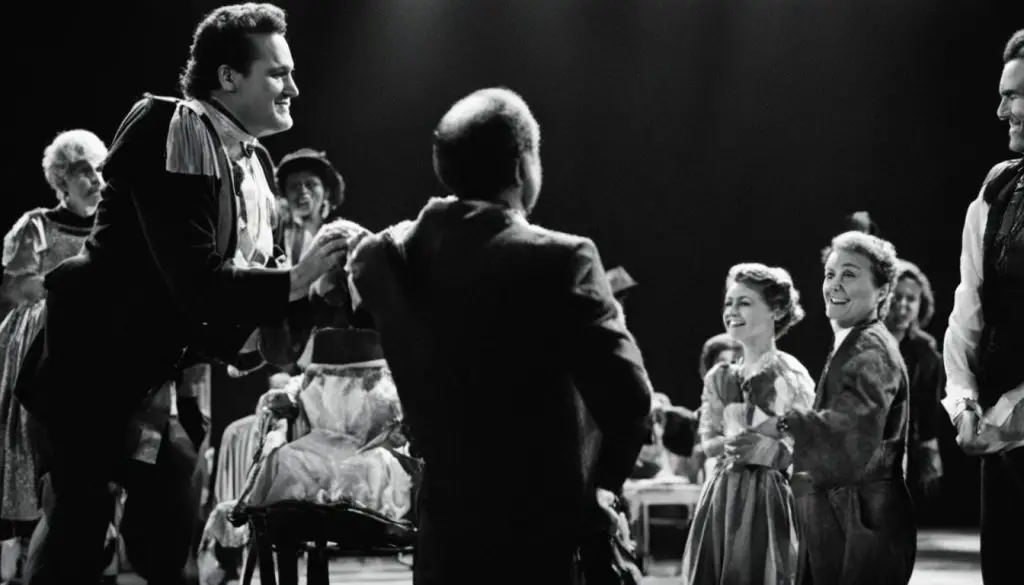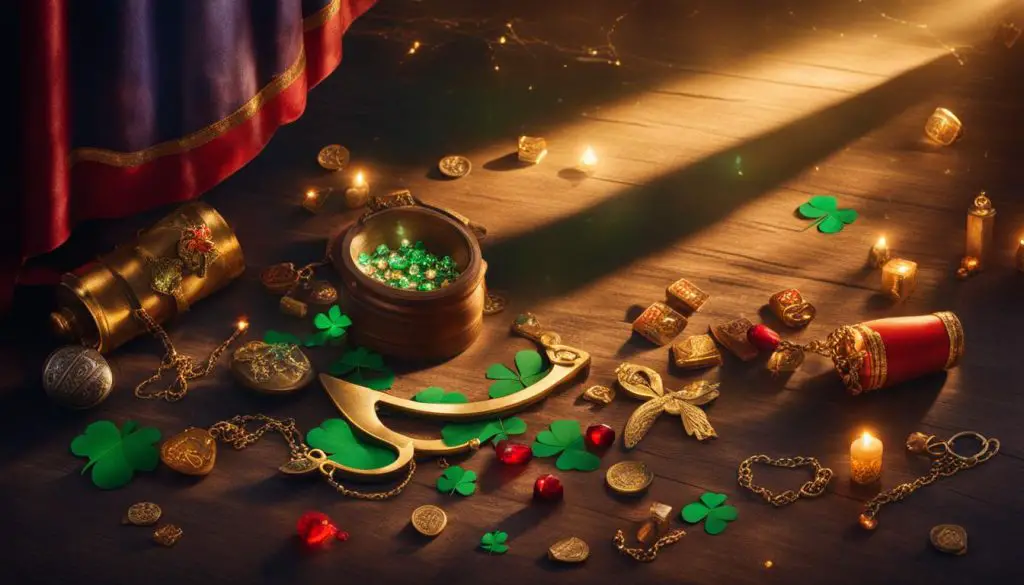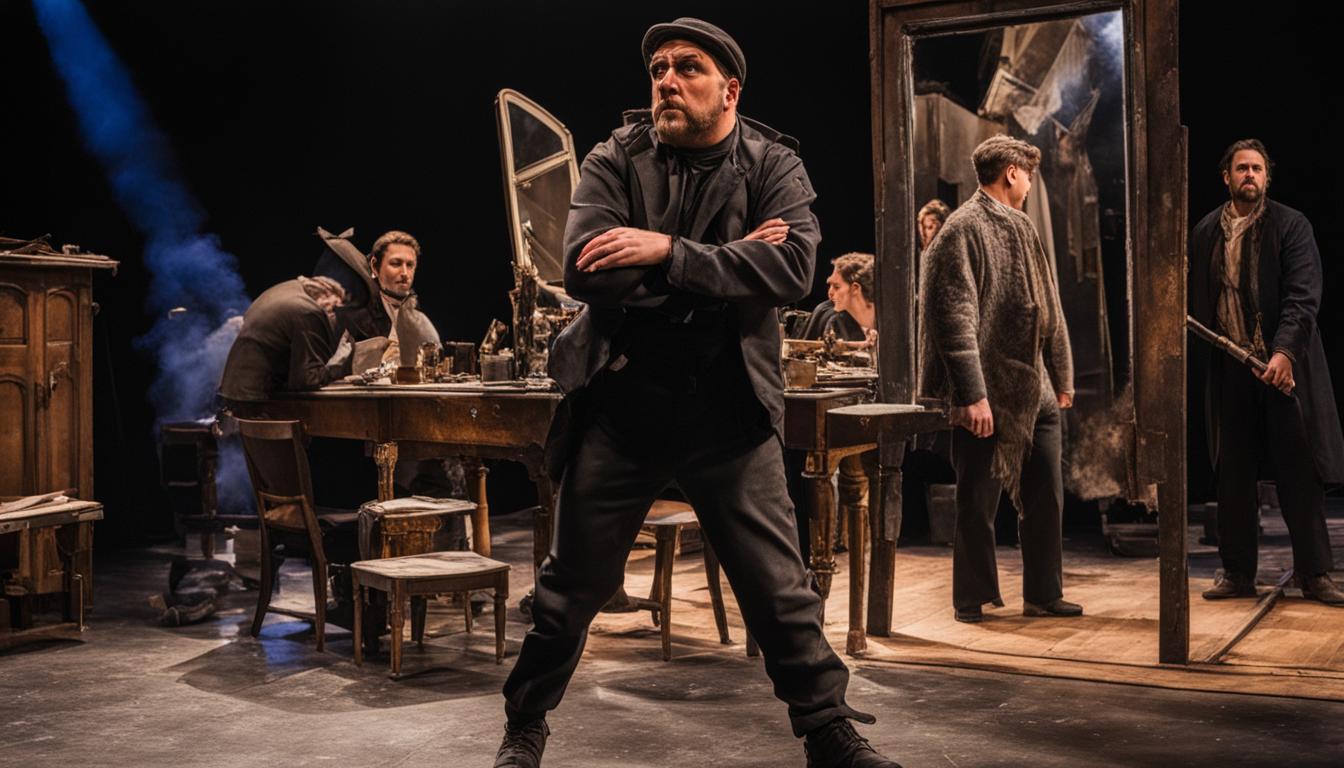The origin of the phrase “break a leg” and its association with good luck in the theater world has intrigued many. It is believed to have originated from a superstition in the theatrical industry, where wishing someone “good luck” was considered bad luck. Instead, the phrase “break a leg” was used to express good luck before a performance. The exact history and reason behind this tradition are not clearly documented, but it is thought to have emerged in the early days of theater. The phrase has since become synonymous with theater and is widely used to wish performers success in their performances.
Contents
- 1 The Superstitions of the Theater Industry
- 2 The Origins of the Phrase “Break a Leg”
- 3 Theater Superstitions and Their Influence on Phrases
- 4 Using Nonsensical Phrases for Language Learning and Vocabulary Building
- 5 Conclusion
- 6 FAQ
- 6.1 What is the origin of the phrase “break a leg”?
- 6.2 Why is “break a leg” considered good luck in the theater?
- 6.3 What are some common theater superstitions?
- 6.4 How are nonsensical phrases and sayings related to theater superstitions?
- 6.5 Can theater superstitions and traditions be found in popular culture?
- 6.6 How can nonsensical phrases be used for language learning?
- 6.7 What is the significance of understanding the origin of the phrase “break a leg”?
- 7 Source Links
Key Takeaways:
- The phrase “break a leg” originated from a superstition in the theater industry.
- Wishing someone “good luck” was considered bad luck, leading to the use of alternative expressions.
- The exact origin of the phrase is uncertain, but it is believed to have emerged in the early days of theater.
- The phrase “break a leg” has become deeply ingrained in theater culture and is widely used to wish performers success.
- Theater superstitions and traditions add a sense of mystery and tradition to the industry.
The Superstitions of the Theater Industry
The theater industry is steeped in a rich history of superstitions and traditions, which have been passed down through generations. These beliefs and customs add an air of mystery and intrigue to the theatrical world. From avoiding the utterance of the name “Macbeth” inside a theater to refraining from whistling onstage, actors and crew members adhere to a wide range of superstitions.
One common belief in theater is the notion that wishing someone “good luck” before a performance is actually bad luck. Instead, the phrase “break a leg” is used to convey good fortune. This superstition is thought to have originated from the idea that inviting luck directly would only bring bad luck instead. By using the seemingly opposite phrase, performers hope to reverse the curse and ensure a successful show.
Theatrical superstitions are deeply ingrained in the industry and serve as a reminder of the challenges and uncertainties faced by those involved in theater. These beliefs help to create a sense of camaraderie and shared understanding among performers and crew members. By adhering to these traditions, they pay homage to the long-standing customs of their craft.
Theatrical Superstitions and Traditions
| Superstition | Explanation |
|---|---|
| Avoiding the word “Macbeth” | It is believed that saying the name of Shakespeare’s play inside a theater brings bad luck, so actors and crew members refer to it as “the Scottish play” instead. |
| Avoiding whistling onstage | Whistling is considered bad luck as it was historically associated with the signaling of scene changes, potentially causing mishaps or accidents. |
| Not wishing “good luck” | Instead of saying “good luck,” theater professionals use the phrase “break a leg” to avoid invoking bad luck. The phrase is seen as a reversal of fortune. |
| Leaving one light on overnight | It is believed that leaving a ghost light on in an empty theater overnight wards off spirits and protects against accidents in the dark. |
These superstitions and traditions are just a few examples of the many intriguing customs that exist within the theater industry. They serve as a reminder of the rich history and cultural significance of theater, adding an element of mystique to the world of entertainment.
The Origins of the Phrase “Break a Leg”
The exact origin of the phrase “break a leg” is uncertain, with various theories and anecdotes surrounding its creation. One theory suggests that the phrase comes from the idea of actors needing to physically break the “legs” (curtains or wings) of a stage to take multiple curtain calls at the end of a successful performance. Another theory suggests that it originated from the German phrase “Hals- und Beinbruch,” which translates to “break your neck and leg” and was used to wish someone good luck. Over time, the phrase evolved into the more commonly used “break a leg” in English-speaking theater circles.
While the true origin remains elusive, the phrase “break a leg” has gained significance in the theater world and has come to be associated with wishing performers success. It is a way to express encouragement and good luck without invoking the potentially unlucky phrase “good luck.” The phrase has become a part of theater culture and is seen as a positive omen before a performance.
The phrase “break a leg” has become deeply ingrained in theater culture and is widely used to wish performers success.
Despite its ambiguous origins, the phrase “break a leg” continues to be used in the theater industry, serving as a reminder of the traditions and superstitions that have shaped the theatrical world. It exemplifies the unique language and customs found within this creative art form, adding to the rich tapestry of theater history.
So the next time you find yourself attending a theater performance or wishing someone well in their artistic pursuits, remember the phrase “break a leg” and the fascinating origins that have made it a beloved tradition in the theatrical community.

The Origins of the Phrase “Break a Leg”
| Theories | Explanation |
|---|---|
| The “legs” theory | Suggests that actors needed to physically break the “legs” (curtains or wings) of a stage to take multiple curtain calls at the end of a successful performance. |
| The “Hals- und Beinbruch” theory | Claims that the phrase originated from the German phrase “Hals- und Beinbruch,” which translates to “break your neck and leg” and was used to wish someone good luck. |
Theater Superstitions and Their Influence on Phrases
The superstitions in the theater industry have not only influenced the use of the phrase “break a leg” but have also given rise to other quirky theatrical phrases and traditions. These phrases, which have become part of everyday language, often have their origins in theater-related customs and traditions.
Theatrical Phrases and Their Meanings
Theater superstitions have contributed to the creation of phrases like “bite the bullet,” “beat around the bush,” and “spill the beans.” These phrases have their roots in theater practices and have found their way into common parlance. For example, “bite the bullet” refers to the act of enduring something difficult, which may have originated from actors physically biting down on a bullet to deal with the pain during surgeries performed on stage in the past.
“Beat around the bush,” on the other hand, is thought to have originated from the practice of actors circling around the stage to avoid unpleasant elements like traps or obstacles that could be hidden in the wings or behind the scenery. The phrase “spill the beans” likely evolved from the act of actors accidentally knocking over containers filled with dried beans backstage, causing a noisy and distracting mess.
These phrases serve as a reminder of the rich history of theater and the influence it has had on language. They provide an insight into the unique world of the theater and its impact on everyday expressions.
Theatrical Traditions and Customs
Theater superstitions and customs often have practical origins. For instance, the tradition of saying “break a leg” instead of “good luck” stems from the belief that wishing someone “good luck” would actually bring bad luck. As a result, the phrase “break a leg” became a way to express good wishes without inviting misfortune.
| Theatrical Phrase | Meaning |
|---|---|
| Bite the bullet | To endure something difficult or painful |
| Beat around the bush | To avoid addressing an issue directly |
| Spill the beans | To reveal a secret or confidential information |
Theater traditions and customs contribute to the unique atmosphere of the theatrical world. From avoiding saying the name “Macbeth” inside a theater to the use of certain gestures and rituals, these practices add an element of mystery and tradition to the theater industry.

The presence of theatrical superstitions in popular culture goes beyond language and phrases. It extends to the portrayal of theater rituals and customs. In movies and TV shows, we often see actors engaging in superstitious behaviors, such as touching wood or wearing specific items of clothing for good luck. These portrayals not only entertain audiences but also provide insights into the peculiarities and traditions of the theater industry.
The influence of theatrical superstitions can also be seen in literature, where authors incorporate these beliefs into their storytelling. Whether it’s a character refusing to utter the name “Macbeth” or a performer discussing the dos and don’ts of wishing someone good luck, these references add authenticity and depth to the narratives. They create a sense of familiarity for readers who are familiar with theater superstitions while introducing others to the intriguing world of theatrical traditions and customs.
Using Nonsensical Phrases for Language Learning and Vocabulary Building
Nonsensical phrases and sayings can be a playful and engaging way to learn a new language and expand your vocabulary. These quirky expressions, often known for their lack of literal meaning, can tickle your curiosity and make the learning process more enjoyable. Incorporating these phrases into your language learning activities can help you remember words and phrases in a memorable and interactive way.
Imagine trying to learn English and coming across phrases like “raining cats and dogs” or “piece of cake.” These nonsensical sayings may seem perplexing at first, but they offer a unique opportunity to explore the intricacies of the language. By delving into the historical and cultural origins of these phrases, you not only expand your vocabulary but also gain insights into the rich tapestry of the English language.
“Language learning is not just about memorizing vocabulary and grammar rules; it’s about embracing the nuances and idiosyncrasies that make a language unique. Nonsensical phrases provide a window into the whimsical side of language, allowing you to appreciate the playful and creative expressions that have evolved over time.”
The power of nonsensical phrases lies in their ability to spark curiosity and inspire exploration. You can create flashcards with these phrases, complete with their meanings and origins, and use them as a fun language learning tool. Challenge yourself to incorporate these phrases into your conversations or written communication, encouraging a deeper understanding of the language and its cultural context. By embracing the playful side of language learning, you’ll not only expand your vocabulary but also develop a deeper appreciation for the subtleties and beauty of the language.

Examples of Nonsensical English Phrases:
| Nonsensical Phrase | Meaning | Origin |
|---|---|---|
| Raining cats and dogs | Heavy rainfall | Origin uncertain, possibly from old English myths |
| Piece of cake | Something easy or effortless | Originated from the idea of a cake being easy to cut and eat |
| Break a leg | Wishing someone good luck | Originated from theater superstitions |
By exploring these nonsensical phrases and their meanings, you’ll not only gain a deeper understanding of the English language but also develop a sense of linguistic playfulness. Language learning doesn’t have to be a dry and tedious process; it can be an exciting journey filled with unexpected delights. So, embrace the nonsensical side of language and let it enhance your learning experience.
Conclusion
The origin of the phrase “break a leg” and its association with good luck in the theater industry remains somewhat mysterious. While the exact origins are unknown, unraveling the mystery behind this phrase reveals its connection to theater superstitions and traditions. By understanding the origin of the saying, we can embrace the rich history and cultural significance that comes with it.
Throughout the years, theater has been steeped in superstitions and customs that add a sense of mystery and tradition to the industry. The phrase “break a leg” has become deeply ingrained in theater culture, replacing the traditional “good luck” wish before a performance. It serves as a reminder of the unique and enduring traditions that exist within the theater world.
Beyond the theater, the use of nonsensical phrases and sayings derived from theatrical customs can also bring a playful element to language learning and usage. Embracing these traditions and incorporating them into language learning activities can make the process more enjoyable and effective. By embracing theater superstitions and traditions, we can deepen our understanding of their origin and appreciate their impact on both the theater industry and language itself.
FAQ
What is the origin of the phrase “break a leg”?
The exact origin is uncertain, but it is believed to have emerged from theater superstitions and traditions.
Why is “break a leg” considered good luck in the theater?
Wishing someone “good luck” in the theater industry is believed to be bad luck. Instead, “break a leg” is used to express good luck.
What are some common theater superstitions?
Some common theater superstitions include avoiding saying the word “Macbeth” inside a theater, never whistling onstage, and never wishing an actor “good luck” before a performance.
Nonsensical phrases and sayings, like “break a leg,” have their origins in theater-related customs and traditions.
Can theater superstitions and traditions be found in popular culture?
Yes, theater superstitions and traditions are often referenced in films, TV shows, and literature, helping to keep them alive and perpetuate theater culture.
How can nonsensical phrases be used for language learning?
Nonsensical phrases can make language learning more engaging and interactive, helping to build vocabulary and practice speaking and writing skills.
What is the significance of understanding the origin of the phrase “break a leg”?
Understanding the origin of “break a leg” and other theater traditions deepens our appreciation for the rich history and culture of theater.









